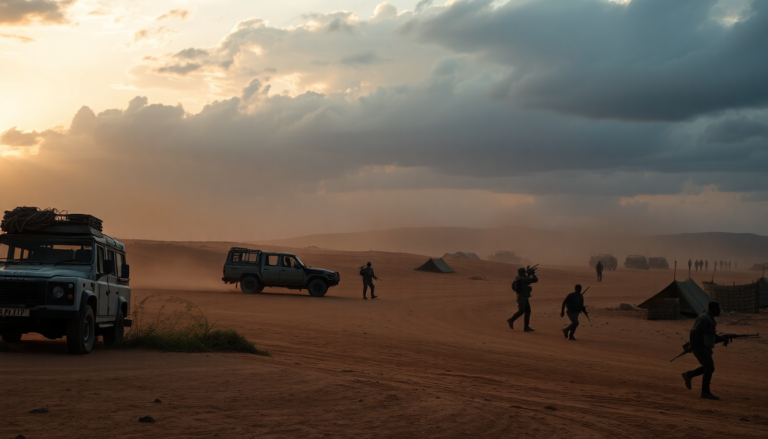The situation in Sudan deteriorates as military forces retreat and paramilitaries claim victory over strategic territories.

Topics covered
In a dramatic turn of events, the Sudanese Armed Forces (SAF) have announced their withdrawal from a crucial border area, setting the stage for a fierce escalation in the ongoing civil war. This move comes as the paramilitary Rapid Support Forces (RSF) declare they have seized control of a strategic zone along the border with Egypt and Libya.
Just days prior, the SAF had accused forces loyal to Libyan commander Khalifa Haftar of launching a cross-border attack alongside the RSF, marking the first instance of direct Libyan involvement in Sudan’s internal conflict.
Military dynamics shift rapidly
On Wednesday, SAF spokesperson Nabil Abdallah stated, “As part of its defensive arrangements to repel aggression, our forces today evacuated the triangle area overlooking the borders between Sudan, Egypt, and Libya.” This announcement highlights the precarious nature of military operations in the region, suggesting a reconfiguration of power as the RSF declares it has ‘liberated’ the area.
The claim was accompanied by assertions that SAF forces retreated southward after sustaining significant losses.
Foreign influence looms large
The backdrop of this conflict is further complicated by allegations of foreign intervention. The Sudanese government has accused the United Arab Emirates of supporting the assault, labeling it a dangerous escalation and a violation of international law.
Such accusations suggest a broader conspiracy, intensifying tensions with foreign powers. The RSF’s recent gains not only signal a shift in military control but also raise questions about the implications of these foreign alliances.
Casualties and humanitarian crisis deepens
Since the civil war erupted in April 2023, the struggle for power between SAF chief Abdel Fattah al-Burhan and his former ally Mohamed Hamdan Daglo, who leads the RSF, has resulted in a catastrophic humanitarian crisis. Tens of thousands have lost their lives, and approximately 13 million people have been displaced, with four million seeking refuge in neighboring countries. The United Nations has labeled the situation one of the worst humanitarian crises in the world, with the fighting showing no signs of abating.
Escalating violence across the region
Despite attempts by international mediators to broker peace, violence continues to escalate, particularly in the western Darfur region and southern Kordofan. The SAF’s withdrawal from critical areas raises urgent questions about the future of governance in Sudan. With both military factions claiming territory, the lines are drawn between the SAF’s control over central and northern Sudan, including the capital, Khartoum, and the RSF’s grip on Darfur and parts of the south.
What lies ahead for Sudan?
The implications of this withdrawal are profound. As the RSF consolidates power, the SAF’s retreat might signal a new phase in this brutal conflict. Will this lead to greater foreign intervention? Will the humanitarian crisis worsen? The international community watches closely as the situation unfolds, leaving many to wonder about the future of Sudan and its people.




